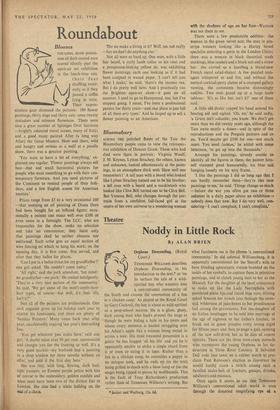Roundabout
Blooms
`You want to have a bit of everything,' ex- plained one regular. 'Flower paintings always sell best—that and small horizontal pictures for people who want something to go with their con- temporary furniture. And you need pictures of the Continent to remind people of their holi- days, and a few English scenes for American tourists.'
Prices range from £3 to a very occasional £60 —that morning an oil painting of Diana Dors had been bought for an inflated figure; occa- sionally a painter can make well over £100 or even more in a fortnight. The LCC, who are responsible for the show, make no selection and take no commission; they insist only that paintings shall be neither obscene nor unframed. Each artist gets an equal section of wire fencing on which to hang his work; on the opening day, it is first come, first served, and after that they ballot for places.
'Can I put in a ballot ticket for my grandfather?' one girl asked. 'He couldn't come today.'
'All right,' said the park attendant, 'but mind : no grandfather—no pitch.' He smiled indulgently. 'They're a very nice section of the community,' he said, 'We get some of the won't-comb-their- hair types, of course—but well, it's their life, isn't it?'' Not all of the painters are professionals. One civil engineer gives up his holiday each year to exhibit his landscapes, and there are plenty of 'Sunday Painters.' Many come back year after year, unashamedly copying last year's best-selling line.
'You get whatever you make here,' said one girl. `A dealer takes over 30 per cent. commission and charges you for the framing as well. It's a very good market—my husband had a painting in a shop window for three months without an offer, and sold it the first day here.'
She was tiny, with long, flowing, dark hair, tight trousers, an Eastern purple jerkin with bits of mirror in the embroidery, golden sandals and what must have been two of the dirtiest feet in London. She also had a white bulldog on the gad of a chain, 'Do we make a living at it? Well, no, not really —but we don't do anything else.'
Not all were so hard up. One man, with a little fair beard, a curly lamb collar to his coat and a prosperous-looking yellow tie, was exhibiting flower paintings, each one looking as if it had been sculpted in waxed paper. 'I can't tell you what I make,' he said, 'there's the income tax. But I do pretty well here. And I practically run the prighton open-air show—it goes on all summer. I used to go to Hampstead, too, but I've stopped going. I mean, I've been a professional painter for thirty years—and that place is just full of all these arty types.' And he leaped up to sell a flower painting to an American.
Bloomsbury
ACROSS THE polished floors of the Tate the Bloomsbury people came to view the retrospec- tive exhibition of Duncan Grant. Those who had died 'were there in portrait : Virginia Woolf, J. M. Keynes, Lytton Strachey; the others, known and unknown, looked affectionately at the paint- ings, in an atmosphere thick with 'How well one remembers!' A tall man with a beard who looked like Lytton Strachey turned out to be his brother; a tall man with a beard and a mackintosh who looked like Clive Bell turned out to be Clive Bell. But Vanessa Bell, who changes through the por- traits from a confident full-faced girl at the centre of her own universe to a wondering woman with the shadows of age on her face—Vanessa was not there to see.
There were a few predictable oddities: the woman in the green velvet suit; the man in pin- stripe trousers looking like a Harley Street specialist detecting a germ in the London Clinic; there was a woman in black theatrical mesh stockings, blue sandals and a black suit and a straw hat : she carried as a handbag a brand-new French metal salad-shaker. A few puzzled teen- agers whispered to and fro; and without the normal cocktail-party clatter of a cramped gallery viewing, the comments became distressingly audible. Two men gazed .up at a large nude tableau : 'It's so like her, isn't it?' one of them said.
A little old dealer cupped his hand around his hearing aid and sighed. 'Oh, no,' he said sadly, 'a Grant isn't valuable, you know. We don't get more than we did twenty years ago, although the Tate owns nearly a dozen—and in spite of the reproductions and the Penguin painters and so on. You'd maybe get £100 for one—not much more. You need fashion,' he added with some bitterness, `to get up into the thousands.'
Amongst his paintings, already unable to identify all the figures in them, the painter him- self stumped good humouredly, his blue suit hanging loosely on his wiry frame.
'I like the paintings I did so long ago that I can hardly remember them—they're like new paintings to me,' he said. 'Things change so much —before the war you often got two or three columns in a daily paper .about an exhibition–, nobody does that now. But I do very well, con- sidering—I can't complain, I can't complain.'






































 Previous page
Previous page